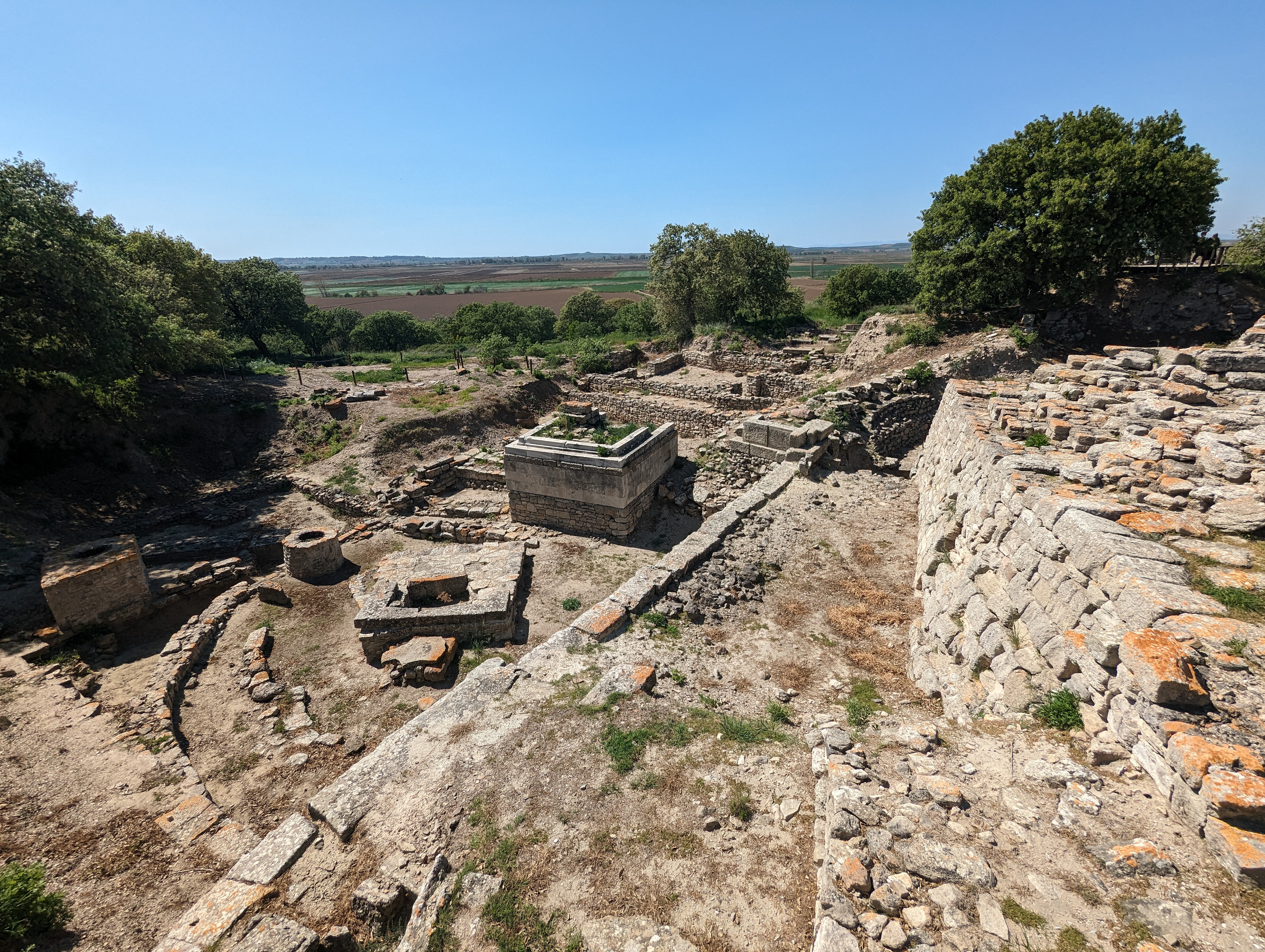Troy, circa 2024
June 20, 2024
The ancient city of Troy, immortalized in Homer's Iliad, is located in northwestern
Turkey, along the Aegean to the south of Istanbul. Leading up to our visit in April, I
read Emily Wilson's new translation of the epic poem. Wilson chose to render Homer's
dactylic hexameter, which is a rhythm compatible with the original Greek, into iambic
pentameter, which is better suited to English and used by most of our own great poets.
It is a vivid experience. Here is just one example:
He threw his spear at Pandarus.
Athena steered it beneath his eye and through his nose,
smashing his white teeth. Then the tireless bronze
cut off his tongue, right at the root—the tip
emerged again beneath his chin. He fell
out of the chariot. His dazzling armor
and shining weapons clattered all around him.
His swift-hoofed horses swerved and galloped off.
His life and spirit were released and lost.
The Iliad: V 290 (Emily Wilson)
Athena steered it beneath his eye and through his nose,
smashing his white teeth. Then the tireless bronze
cut off his tongue, right at the root—the tip
emerged again beneath his chin. He fell
out of the chariot. His dazzling armor
and shining weapons clattered all around him.
His swift-hoofed horses swerved and galloped off.
His life and spirit were released and lost.
The Iliad: V 290 (Emily Wilson)
More than a movie, the Iliad was dozens of hours of premium television, sung by a bard
who knew it by heart. Other passages cut deep in a different way:
No man can get away
from destiny, first set for us at birth,
however cowardly or brave he is.
The Iliad: VI 487-489 (Emily Wilson)
from destiny, first set for us at birth,
however cowardly or brave he is.
The Iliad: VI 487-489 (Emily Wilson)
Standing on what remains of the citadel of ancient Troy and looking out over the plain,
beyond which the "swift Greek ships" would have been docked, was one of the highlights
of my life.
I could hear Hector's wife, Andromache, pleading with him to remain with her and their
young son behind the "sturdy walls of Troy" instead of going out to face Agamemnon's
coalition; and old king Priam, watching as Hector, his beloved son, was later chased down
and mercilessly killed by Achilles; and Hecuba, Hector's mother, wailing on the
citadel's walls as her son's body is dragged through the dirt back to the Greek camp.
It's a brutal work, and a reminder of the devastating cost of war. In Achilles' own
words:
If only conflict were eliminated
from gods and human beings! I wish anger
did not exist. Even the wisest people
are roused to rage, which trickles into you
sweeter than honey, and inside your body
it swells like smoke—just so, Lord Agamemnon
enraged me. But that happened in the past.
So let it go, though I am still upset.
I must control the feelings in my chest,
and go to look for Hector, who destroyed
the one I loved the most, my head, my life.
Thereafter, I will welcome death, whenever
Zeus and the other deathless gods may wish
to bring it.
The Iliad: XVIII 105-118 (Emily Wilson)
from gods and human beings! I wish anger
did not exist. Even the wisest people
are roused to rage, which trickles into you
sweeter than honey, and inside your body
it swells like smoke—just so, Lord Agamemnon
enraged me. But that happened in the past.
So let it go, though I am still upset.
I must control the feelings in my chest,
and go to look for Hector, who destroyed
the one I loved the most, my head, my life.
Thereafter, I will welcome death, whenever
Zeus and the other deathless gods may wish
to bring it.
The Iliad: XVIII 105-118 (Emily Wilson)
All this, on the plains of Troy.
